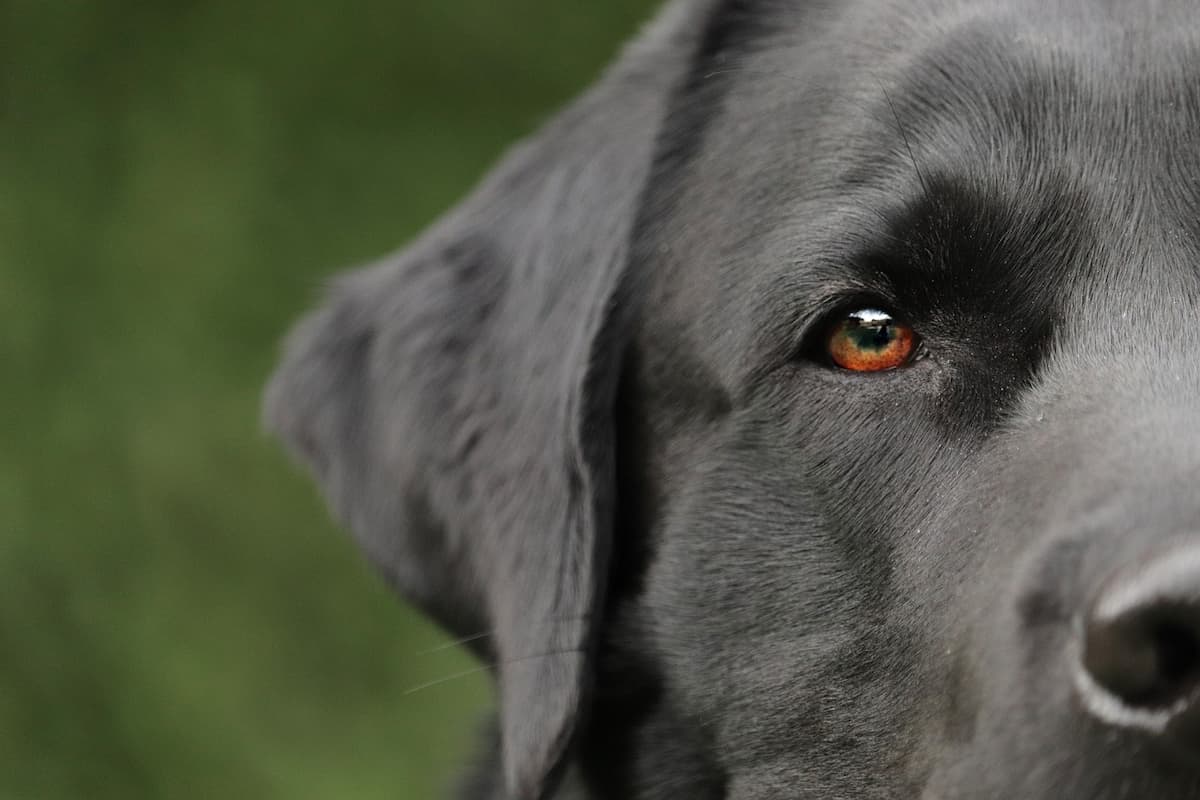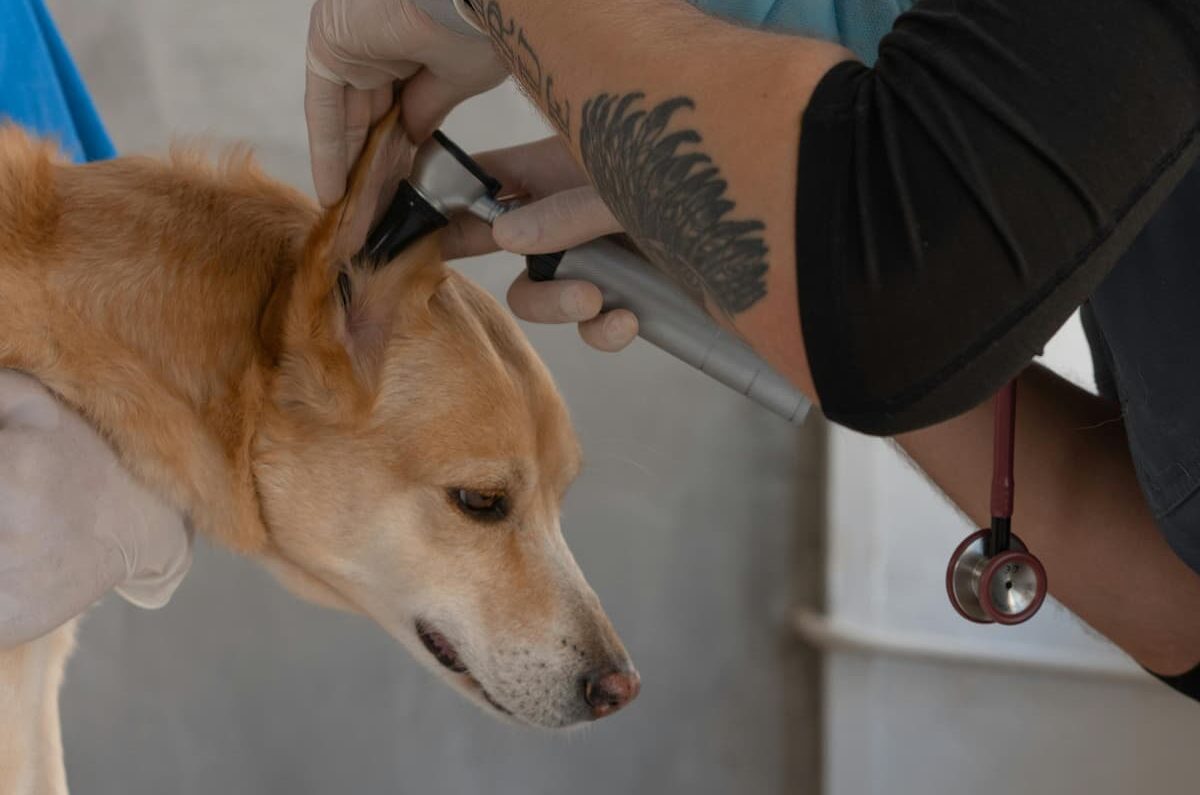Picture this: you’re sitting on the couch, engrossed in a book, when suddenly, your furry friend comes bounding over, tail wagging, ready to shower you with affection.
As you lean in for a cuddle, your dog’s wet tongue darts towards your ear.
Ah, the unmistakable tickle of a slobbery ear lick!
It’s both amusing and endearing, but have you ever wondered why dogs are drawn to our ears like magnets?
This article will answer the question: Why do dogs have such a strange fascination with licking our ears?
Why Do Dogs Often Lick Your Ears?
Dogs have their own unique language when it comes to communication, and one interesting behavior that often leaves owners puzzled is ear licking.
You may have witnessed your furry friend vigorously licking another dog’s ears or even attempt to lick your own ears.
But why do dogs engage in this seemingly odd behavior?
Here are some of the roles ear-licking plays in canine communication:
1. Sign of affection: Licking is a natural way for dogs to show affection towards each other and their human companions.
It’s their way of saying, “I care about you!”
When a dog licks another dog’s ears, it can be a sign of bonding and friendship.
The ritual of ear-licking is often reciprocal, with both dogs taking turns in grooming each other’s ears.
So, the next time you catch your pup giving your other four-legged friend a good ear-cleaning, remember that it’s their unique way of expressing love.
2. Establishing hierarchy: Dogs are social animals and have a natural inclination towards establishing hierarchies within their pack.
Ear-licking can serve as a way for a dominant dog to assert its authority over a more submissive one.
By licking another dog’s ears, the dominant dog is showing its superiority and reminding the submissive dog of its place in the pecking order.
It’s a subtle yet effective way for dogs to maintain harmony and order within their social structures.
3. Seeking attention or alleviating stress: In some cases, dogs may lick ears as a way to seek attention or relieve stress.
Dogs have taste receptors on their tongues, and the act of licking releases endorphins, which can have a calming effect on their emotional state.
So, if your pup is feeling anxious or uncertain, they may resort to licking their own ears or yours to self-soothe.
Additionally, ear-licking can be a strategy to grab your attention and get you to shower them with affection or offer reassurance during times of unease.
4. Exploring scents and tastes: Dogs have a refined sense of smell, and their tongues are not only for tasting but also for gathering information about the world around them.
When they lick your ear, they are not only detecting the unique scent that is specific to you but also exploring different tastes and textures.
They might detect unique smells like shampoo, earwax, or even the lingering fragrance of your favorite perfume!
It’s their way of learning more about their environment and the people or animals they interact with.
Examining Health Impacts of Dogs Licking Ears
Now that you understand why dogs like to lick your ears, here are some health benefits and risks associated with this behavior:
1. Communication and bonding
When a dog licks your ears, they may be trying to communicate with you.
Dogs use various forms of body language and touch to express emotions and establish a connection.
Licking the ears is a way for them to show trust and affection, just like kissing someone on the cheek.
It’s their special way of saying, “I care about you!”
So, next time your pooch tries to give your ears a bath, cherish the moment as it strengthens the bond you share.
2. Cleaning and grooming
Dogs have a keen sense of smell and are naturally drawn to scents.
Your ears might seem like an interesting source of intriguing smells to them.
Additionally, dogs have a grooming instinct, and licking is their way of keeping themselves and their loved ones clean.
The gentle motion of their tongue can remove dirt, debris, or even excess earwax from your ears.
While it may not exactly be the most glamorous beauty treatment, it’s a sign of their love and desire to care for you.
3. Potential health risks
Though doggy kisses can feel delightful, it’s important to be aware of the potential risks involved.
Dogs’ mouths harbor bacteria that may not be harmful to them but could be problematic for humans.
In rare cases, these bacteria can cause infections if they enter any irritated areas or cuts in the ear.
Additionally, excessive licking can lead to skin irritation or dermatitis, especially if the dog’s saliva stays on the skin for an extended period.
To ensure the well-being of both you and your furry friend, keep your ears clean, and if you notice any signs of irritation or infection, consult a healthcare professional.
Tips to Manage and Modify Your Dog’s Ear Licking Behavior
Are you constantly bombarded by slobbery dog kisses on your ears?
While it may seem cute at first, excessive ear licking can become a nuisance.
But fear not, there are ways to manage and modify this behavior.
Here are some tips to help you put a stop to those wet ear assaults:
1. Determine the Underlying Cause: Before you can effectively address your dog’s ear licking behavior, it’s important to understand why they’re doing it.
There could be several reasons such as allergies, ear infections, or even just seeking attention.
Consult with your veterinarian to rule out any medical issues and get expert advice on how to proceed.
2. Provide Distractions: Much like humans, dogs can develop bad habits out of boredom.
To deter them from licking your ears, provide alternative distractions.
Fill a Kong toy with peanut butter or offer them puzzle toys that require problem-solving.
Engaging their mind and providing mental stimulation can redirect their focus away from your ears.
3. Positive Reinforcement: Positive reinforcement is a powerful tool when it comes to modifying your dog’s behavior.
Whenever your furry friend refrains from licking your ears, reward them with praise, treats, or even a short play session.
By associating good behavior with rewards, you can encourage them to prioritize other activities over ear licking.
Establishing a Safe Environment to Deter Ear Licking in Dogs
Now, while it’s certainly adorable to have our furry friends shower us with their affectionate ear licks, it’s important to create a safe and engaging environment that discourages this behavior, especially if it becomes excessive.
Here are a few tips to help you out:
- Provide plenty of toys and interactive games to keep your dog mentally stimulated and distracted from licking your ears.
- Set boundaries by using commands like “no licking” and rewarding them when they listen.
- Redirect their focus by offering them a chew toy or a treat to engage with instead.
- If your dog’s ear licking becomes obsessive or bothersome, consult with a professional trainer or veterinarian to rule out any underlying health issues.
Remember, while it’s natural for dogs to want to lick our ears, it’s important to strike a balance between affection and boundaries to create a safe and enjoyable environment for both you and your furry friend.
FAQ
Q: Is there a specific motive behind this ear-licking obsession?
A: Well, to dogs, our ears are like a treasure trove of information waiting to be discovered.
These curious creatures use their powerful sense of smell, along with their taste buds, to gather all sorts of scents and flavors.
So, when they give your ears a slobbery slurp, they’re trying to understand you better and explore your unique scent.
Q: Is it possible that ear licking is a sign of affection?
A: Absolutely!
Dogs are masters at showing love and affection, and ear licking is just another way they express their feelings towards us.
In the canine world, licking is considered a bonding behavior.
It’s their way of saying, “Hey, I care about you, and I consider you a part of my pack.”
It’s like a wet, sloppy kiss, just without the romantic undertones!
Q: But what if a dog’s ear licking becomes excessive?
A: Ah, the endless kisses that might drive you a little bonkers!
While a few licks here and there are generally harmless, excessive ear licking could be a sign of a deeper issue.
It might indicate anything from allergies or skin irritations to ear infections, so it’s worth paying attention to your canine companion’s overall health.
If you notice persistent licking or any concerning symptoms, it’s always best to consult with a veterinarian.
Q: Can humans get sick from a dog’s ear licking?
A: Fear not, ear-licking enthusiasts!
Although it might make you cringe a bit, it’s highly unlikely to make you sick.
Generally, the bacteria found in a dog’s mouth are different from the ones that affect humans.
So, while it may not be the most sanitary activity, the chances of catching something are slim.
Just remember to keep up with regular handwashing to maintain good hygiene, whether your dog loves to lick ears or not.
Q: How can people discourage ear licking if they find it bothersome?
A: If the constant ear licking has become bothersome, there are a few things you can try to redirect this behavior.
One approach is to gently discourage your dog by calmly saying “no” or providing an alternative, such as a chew toy.
Another effective method is to teach your canine pal a command like “leave it,” helping them learn when it’s time to stop.
Consistency, positive reinforcement, and patience are key when reshaping a dog’s behavior.
Q: Are there any other ways to show affection to dogs without indulging their ear-licking tendencies?
A: Absolutely!
Dogs appreciate affection in many forms.
They are thrilled by ear scratches, belly rubs, and a good ol’ game of fetch.
Some dogs are particularly fond of being brushed or groomed, as it mimics the gentle touch of their fellow pack members.
Remember, every dog is unique, so observe and experiment to figure out what your furry companion enjoys most.
Q: In conclusion, what should we take away from this exploration into the world of ear licking?
A: Dogs lick our ears for various reasons, ranging from their keen sense of smell to expressing their affection and forming a stronger bond.
While it may not always be the most pleasant sensation or desired behavior, it usually stems from a place of love and curiosity.
If you find the ear licking excessive or bothersome, it’s worth checking in with your vet and gently reshaping your dog’s behavior using positive reinforcement techniques.
After all, our four-legged friends have unique ways of showing how much they care!
The Last Word
Dogs various reasons behind their ear-licking behavior, ranging from simple affection and grooming instincts to seeking attention or expressing their excitement.
But let’s not forget about their mighty sense of smell, which allows them to detect unique scents and flavors we may not even be aware of.
So, the next time your faithful companion decides to shower your ears with slobbery kisses, you’ll know they’re telling you they love you or asking for your undivided attention.
Perhaps they’re just indulging in their instinctive grooming rituals, making sure you’re looking pawfect too.
Or maybe, they’ve caught a whiff of something delicious lingering in the corners of your ears.
Whatever the reason may be, we can be assured that a dog’s lick is a gesture full of love, devotion, and a touch of canine quirkiness.














